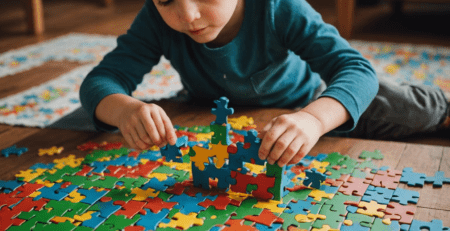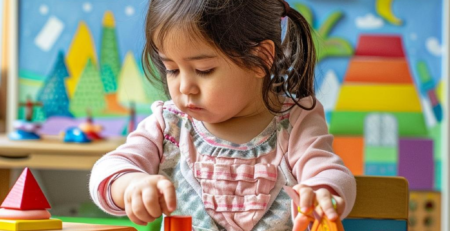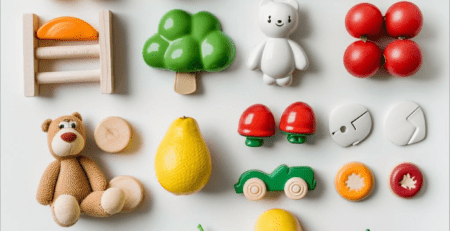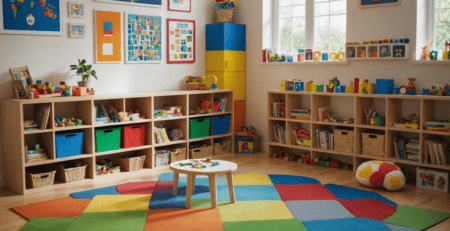
30
Top Montessori Parenting Tips for Child Development: Unlocking Your Child’s Potential
Attention all parents! If you are looking for a new approach to parenting that promotes independence, creativity, and self-discipline in your child, then look no further than the Montessori method. Developed by Dr. Maria Montessori, this alternative approach to traditional parenting values the child’s individuality and aims to foster their natural curiosity and love for learning. In this article, we will explore some valuable Montessori parenting tips that will help you create a nurturing and empowering environment for your child to thrive. Get ready to revolutionize your parenting style and witness the amazing results of the Montessori method.
Table of Contents
- The Principles of Montessori Parenting
- Creating a Montessori-Friendly Environment at Home
- Encouraging Independence and Self-Discipline in Children
- Fostering a Love of Learning in Your Child
- The Role of Observation and Guidance in Montessori Parenting
- Practical Ways to Incorporate Montessori Principles into Daily Parenting
- Nurturing Creativity and Curiosity in Your Child
- Q&A
- Concluding Remarks
The Principles of Montessori Parenting
Montessori parenting is a philosophy based on the teachings of Dr. Maria Montessori, an Italian physician and educator. It emphasizes independence, freedom within limits, and respect for a child’s natural psychological, physical, and social development. Here are some key principles of Montessori parenting to help you create a nurturing and empowering environment for your child.
1. Respect for the Child
One of the core principles of Montessori parenting is respecting the child as an individual. This means acknowledging their needs, desires, and unique abilities. By doing so, parents can create a supportive environment that promotes self-confidence, self-discipline, and self-motivation. When children feel respected, they are more likely to develop a strong sense of independence and responsibility.
2. Child-Led Learning
In the Montessori approach, parents encourage child-led learning by providing a prepared environment that allows children to explore and discover at their own pace. This involves offering age-appropriate materials and activities that foster independence and problem-solving skills. By following the child’s interests and allowing them to take the lead in their learning journey, parents can foster a love for learning and a natural curiosity in their children.
Creating a Montessori-Friendly Environment at Home
Montessori parenting emphasizes independence, freedom within limits, and a respect for a child’s natural psychological, physical, and social development. can greatly benefit your child’s overall growth and development. Here are some tips to help you achieve this:
1. Child-Centered Spaces
Designate specific areas within your home for your child’s activities. Create spaces for playing, reading, art, and other activities that your child enjoys. This helps in fostering independence and encourages your child to take ownership of their environment.
2. Child-Sized Furniture
Invest in child-sized furniture such as tables, chairs, and shelves. This allows your child to comfortably engage in activities without constantly needing adult assistance. It also promotes a sense of empowerment and autonomy.
3. Practical Life Activities
Integrate practical life activities into your daily routine. Set up a child-friendly kitchen area where your child can participate in age-appropriate cooking and food preparation activities. This helps in developing fine motor skills, independence, and a sense of responsibility.
4. Open Shelving and Organized Spaces
Use open shelving and organized spaces to display toys, books, and materials in an accessible and visually appealing manner. This allows your child to easily see and select items for play or exploration, promoting independence and decision-making.
5. Nature-Inspired Elements
Incorporate natural materials and elements such as plants, wooden toys, and natural fabrics into your home environment. This connects your child to the natural world and provides sensory experiences that support overall development.
6. Real-Life Experiences
Encourage real-life experiences such as caring for plants, pets, or engaging in simple household chores. This fosters a sense of responsibility, empathy, and practical skills that are essential for a child’s development.
Creating a Montessori-Friendly environment provides a supportive and nurturing space for your child to learn, explore, and grow. By implementing these tips, you can help your child develop important life skills and independence while fostering a love for learning and discovery.
Encouraging Independence and Self-Discipline in Children
Raising independent and self-disciplined children is a goal that many parents strive for. In Montessori parenting, there are several tips and strategies that can be implemented to foster independence and self-discipline in children from a young age.
Encourage self-help skills: By allowing children to do things for themselves, such as dressing themselves, preparing their own snacks, and tidying up after themselves, you are fostering a sense of independence and self-reliance.
Provide choices: Offering children choices, such as what to wear, what to eat for snacks, and what activities to engage in, allows them to feel a sense of control over their own lives, promoting self-discipline and decision-making skills.
Set clear expectations: By setting clear and consistent expectations for behavior, children learn to understand boundaries and develop self-discipline. This can be achieved through positive discipline techniques and gentle guidance.
| Benefits |
|---|
| Builds confidence and self-esteem |
| Promotes problem-solving skills |
| Teaches responsibility and accountability |
Fostering a Love of Learning in Your Child
When it comes to raising a child, fostering a love of learning is essential for their development. As parents, it’s important to provide an environment that encourages curiosity, exploration, and a thirst for knowledge. Montessori parenting tips offer valuable insights on how to cultivate a love of learning in your child from an early age.
Encourage Independence
One of the core principles of Montessori parenting is to promote independence in children. Encouraging your child to do things on their own, such as dressing themselves, preparing a snack, or cleaning up their toys, helps to build confidence and a sense of mastery. This independence fosters a love of learning as children become more curious about the world around them and seek out new challenges.
Create a Prepared Environment
Creating a prepared environment at home is another key aspect of Montessori parenting. This includes setting up spaces that are organized, visually appealing, and accessible to children. By having a designated area for activities like reading, art, and practical life skills, you can stimulate your child’s curiosity and promote a love of learning in a nurturing and inviting space. Additionally, providing age-appropriate learning materials and tools can further ignite their curiosity and passion for exploration.
| Age Group | Learning Materials |
|---|---|
| Toddlers | Colorful books, sensory toys, stacking blocks |
| Preschoolers | Puzzles, art supplies, nature exploration kits |
| School-Age Children | Science kits, educational games, musical instruments |
By incorporating these Montessori parenting tips into your child’s daily routine, you can nurture a love of learning that will benefit them throughout their lives.
The Role of Observation and Guidance in Montessori Parenting
Montessori parenting is a unique approach that focuses on fostering independence and self-discipline in children. Central to this approach is the role of observation and guidance in helping children develop their full potential. By observing children’s interests, needs, and abilities, parents can better understand how to guide them towards independent exploration and learning.
Observation: One of the key principles of Montessori parenting is the emphasis on careful observation of children. By watching and understanding their behaviors, parents can gain valuable insight into their preferences, skills, and developmental milestones. This allows for a more personalized approach to parenting, tailored to the individual needs of each child.
Guidance: In Montessori parenting, guidance is provided in a way that allows children to explore and learn at their own pace. Instead of dictating or directing, parents guide their children towards activities and experiences that align with their interests and abilities. This approach fosters a sense of autonomy and self-motivation, setting the stage for lifelong learning and personal growth.
Practical Ways to Incorporate Montessori Principles into Daily Parenting
Montessori principles are not just for the classroom; they can also be applied to parenting in order to create a nurturing and educational environment for your child at home. Here are some practical ways to incorporate Montessori principles into your daily parenting:
- Encourage Independence: Allow your child to do things for themselves, such as dressing, eating, and cleaning up after themselves. Provide child-sized tools and furniture to make it easier for them to do so.
- Create a Prepared Environment: Set up your home in a way that allows your child to freely explore and learn. This may include having low shelves for toys and activities, a child-friendly kitchen area, and a cozy reading nook.
- Follow Your Child’s Interests: Observe your child and provide them with opportunities to explore activities and subjects that spark their curiosity. This could involve nature walks, visits to museums, or simply engaging in their play.
By incorporating these practical Montessori principles into your daily parenting, you can foster your child’s independence, creativity, and love for learning in a natural and fulfilling way.
Nurturing Creativity and Curiosity in Your Child
When it comes to nurturing creativity and curiosity in your child, the Montessori approach offers valuable insights and techniques. The Montessori method is centered around promoting independence, self-direction, and hands-on learning, all of which are essential for fostering creativity and curiosity in young minds. Here are some Montessori parenting tips to help you inspire your child’s natural creativity and thirst for knowledge.
Encourage open-ended play: Create an environment that allows your child to engage in open-ended play, where they can explore and experiment freely without predefined outcomes. Provide them with simple, natural materials such as wooden blocks, play dough, and art supplies, and let their imagination take the lead. Open-ended play encourages creativity, problem-solving, and critical thinking skills.
Foster a love for learning: Create a learning-rich environment at home by filling it with books, puzzles, and educational toys. Encourage your child to ask questions and explore their interests. Follow their lead and help them discover new things through hands-on experiences and meaningful interactions with the world around them.
| Montessori Parenting Tips |
|---|
| Encourage open-ended play |
| Foster a love for learning |
Q&A
Q: What is Montessori parenting?
A: Montessori parenting is a parenting philosophy based on the principles of Maria Montessori, an Italian educator. It focuses on fostering independence, respect, and responsibility in children.
Q: What are some key Montessori parenting tips?
A: Some key Montessori parenting tips include creating a prepared environment for the child, allowing the child to make choices, encouraging independence, and promoting hands-on learning experiences.
Q: How can Montessori parenting benefit children?
A: Montessori parenting can benefit children by promoting self-confidence, self-discipline, and a love for learning. It also helps children develop fine and gross motor skills, critical thinking, and problem-solving abilities.
Q: How can parents incorporate Montessori principles into their daily routine?
A: Parents can incorporate Montessori principles into their daily routine by involving children in everyday tasks such as cooking, cleaning, and gardening. They can also provide age-appropriate toys and materials that encourage exploration and creativity.
Q: What are some common misconceptions about Montessori parenting?
A: Some common misconceptions about Montessori parenting include the belief that it requires expensive materials or that it only applies to preschool-aged children. In reality, Montessori principles can be applied in various settings and with children of all ages.
Q: How can parents learn more about Montessori parenting?
A: Parents can learn more about Montessori parenting by reading books and articles on the topic, attending parenting workshops or classes, and connecting with other parents who follow the Montessori philosophy. There are also many online resources available to support parents in implementing Montessori principles at home.
Concluding Remarks
In conclusion, Montessori parenting offers a unique and holistic approach to raising children that focuses on independence, self-discipline, and a love for learning. By incorporating the Montessori philosophy into your parenting style, you can create an environment that fosters creativity, curiosity, and a strong sense of self. Whether you are considering enrolling your child in a Montessori school or simply seeking to incorporate Montessori principles into your home, these tips will help you on your journey to becoming a Montessori-inspired parent. Embracing the Montessori method can truly transform the way you interact with your child and contribute to their overall development. Remember, the key to successful Montessori parenting is to trust in your child’s innate ability to learn and grow at their own pace. By providing them with a supportive and nurturing environment, you can set the stage for a lifetime of success and fulfillment. So, take these tips to heart and embrace the Montessori philosophy as you guide your child through their formative years. Your efforts will undoubtedly yield a future filled with confident, independent, and creative individuals.










